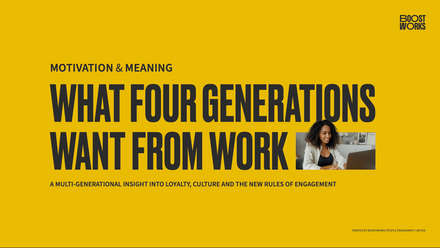7 tips for supporting groups of workers with different needs
Employee engagement is often key to building a profitable and successful business.
Research shows that companies with high employee engagement are 22% more profitable. A recent Gallup study in the US found that those workers who ‘strongly agree’ that their organisation cares about their wellbeing are five times more likely to serve as an advocate for their employer and considerably less likely to look for a new job.
It is therefore crucial that businesses adapt to the changing workplace and look at how to best support their workforce and foster employee engagement.
Since employee engagement is key to retaining and motivating talented and productive employees, employers must recognise that employees are individuals who require support tailored to meet each of their needs. A one-size-fits-all approach is outdated and problematic in an environment when work culture and life balance are as important as more traditional drivers such as compensation.
We're all different
So, how do you cater to the individual when supporting a diverse workforce providing for the needs of multiple groups such as parents and carers, LGBTQ+ employees, those experiencing medical issues or simply helping employees cope with life events?
Increasingly, legislation is being enacted to better support those who need it in the workplace, but progress is slow. To effect real change companies need to take dynamic and forward-thinking steps to guarantee that they fully support the all employees. Consider the following when trying to foster a supportive environment:
1. Get to know your employees
An employee who feels seen and heard as an individual will be more willing to engage with their job. Understanding what employees need will enable you to provide benefits that cater to those diverse needs.
2. Celebrate diversity
Every employee is different, so celebrate and harness the opportunities this creates. Encouraging discussion about people’s lives outside of the office helps us understand this diversity.
Think about what training you can offer and topics that might interest your employees such as estate planning, fertility, stress, menopause, caregiving and bereavement, which may help support multiple different groups in different ways.
3. Target your benefits
Look at ways your benefits package can be crafted to support specific groups. The Covid-19 pandemic has highlighted the enhanced difficulties for those with a caring role and the challenges of juggling competing work and home responsibilities.
Investigate benefits which can be targeted to support your employees through all life events and stages. Do not forget short-term options such as emergency childcare, eldercare support, support through gender confirmation surgery, as well as bespoke services which adapt to the needs of the particular employee.
4. Review current policies
It is important to ensure that company policies are relevant for a diverse workforce and do not discriminate against or alienate specific groups. For example, beware of polices that could distinguish based on gender such as dress code, flexible working for mothers only, support with fertility issues for heterosexual couples or only women, or insufficient parental leave for non-mothers.
Also, issues can arise in unexpected places. For example, a transgender person may not feel comfortable providing references from a company where they worked in a previous gender, or asked to provide identity documents that still list the name and sex assigned to them at birth.
5. Consider flexible working
Flexible working removes barriers to jobs and opens the field to those who might not otherwise be able to apply for roles (parents, carers, those with a disability, those suffering ill health, someone undergoing fertility treatment). This not only permits a more diverse workforce, but also results in improved financial returns for a business.
By making all roles flexible by default, this expands the pool (and therefore potential calibre) of job applicants and fosters an enhanced sense of motivation and company loyalty among employees.
6. Encourage feedback
Employee feedback is often key to understanding your workforce. Increased employee engagement has been found not only to boost performance but to improve business results (including customer ratings, profitability and productivity) as well as reducing less desirable ones (such as absenteeism). Consider how honest feedback can be obtained in a supportive and open environment for all, such as collecting it anonymously.
7. Constantly reassess
Keeping on top of and regularly reassessing whether your benefits and wellbeing offerings support all your employees is important to ensure inclusive benefits. Recognising that work and home life cannot be compartmentalised and introducing ways to manage the myriad of demands and issues faced by employees will ensure that your workforce feels fully supported.
Whether it is a sick child, caring responsibilities, elderly parents, dealing with a bereavement, struggling with a relationship breakdown or dealing with fertility issues, it is important to consider offering something to suit everyone.
Employers that truly support and understand the diverse needs of each employee get the best results. Diversity is an opportunity for employers to harness the true power of their workforce. Employees that feel fully supported will not only outperform their peers, but will be able to give their best to the role.
Supplied by REBA Associate Member, ApiaryLife
Life stage and life event support delivered by experts with legal backgrounds.








